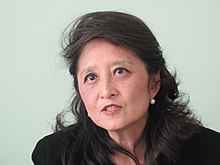Yuan Chang
Yuan Chang (born November 17, 1959 in Taipei , Taiwan ) is a Chinese-born American virologist and pathologist . She became internationally known as a co-discoverer of two cancer viruses in humans. Since March 2012, Chang has been the Distinguished Professor of Pathology in the Department of Pathology at the University of Pittsburgh .
Life
Yuan Chang moved to the United States with her parents as a child and grew up in Salt Lake City . From 1977 to 1979 she first studied East Asian studies and molecular biology at Wellesley College in Wellesley (Massachusetts) and then moved to Stanford University , where she earned a bachelor's degree in biology in 1981. In the same year she moved to the University of Utah , where she studied medicine and passed the MD exam in 1987 .
From 1987 to 1989 she was resident in Anatomic Pathology in the Department of Pathology at the University of California in San Francisco . From 1989 to 1992 she worked at Stanford University with Dikran Houroupian with neuropathology and in 1993 went to Columbia University , where she initially dealt with the genetics of brain tumors, from 2000 as a professor of pathology. Since July 2002, Chan has been Professor of Pathology at the University of Pittsburgh (American Cancer Society Professor of Pathology).
research
At Columbia University she and her husband Patrick S. Moore discovered human herpesvirus 8 (HHV-8) in 1994 , initially named Kaposi's sarcoma-associated herpesvirus , KSHV. They showed that the virus causes Kaposi's sarcoma and lymphoma of serous body cavities (Primary Effusion Lymphoma). Chang also sequenced the virus genome, which enabled tests to be developed and the proteins involved in the virus causing cancer to be discovered.
Using a technique developed in their laboratory to find new human tumor viruses (Digital Transcriptome Subtraction, DTS), Moore and Chang, together with Huichen Feng and Masahiro Shuda, found another human tumor virus, the Merkel cells - polyomavirus as a likely cause of Merkel cell carcinoma . The technique used in the search for the cause of Kaposi's sarcoma was based on the idea of subtracting the entire human genome from the total genome of the tumor cells, so that in the best case only that DNA remains as the "remainder" that does not belong to the genome of the Humans, but belongs to the genome of the virus. The polyomavirus was identified using a modified strategy in which only the mRNA was examined.
Honors
Yuan Chang received the Robert Koch Prize with Patrick S. Moore in 1998 and the Charles S. Mott Prize for Cancer Research from General Motors in 2003 . Furthermore she received u. a. the New York Mayor's Award of Excellence in Science and Technology (1999), the Meyenburg Prize (1997), the Paul Marks Prize for Cancer Research (2003), and the Carnegie Life Science Award (2009).
In 2017, Chang and Moore were awarded the Paul Ehrlich and Ludwig Darmstaedter Prize and the Passano Award .
Yuan Chang is u. a. Elected member of the American Society for Clinical Investigation (since 2004), the American Academy of Microbiology (since 2010), the National Academy of Sciences (since 2012) and the Association of American Physicians (since 2014). She has also been a member of the US National Cancer Advisory Board (NCAB) since 2015.
Since 2017 she has ranked Clarivate Analytics among the favorites for a Nobel Prize in Physiology or Medicine ( Clarivate Citation Laureates , formerly Thomson Reuters Citation Laureates ) due to the number of her citations .
Web links
Individual evidence
- ↑ Background information on the awarding of the Paul Ehrlich and Ludwig Darmstaedter Prize 2017. On: uni-frankfurt.de of March 14, 2017
- ↑ The 2017 Clarivate Citation Laureates - Clarivate. In: clarivate.com. Retrieved September 21, 2017 .
| personal data | |
|---|---|
| SURNAME | Chang, yuan |
| BRIEF DESCRIPTION | Chinese virologist |
| DATE OF BIRTH | 17th November 1959 |
| PLACE OF BIRTH | Taipei |
